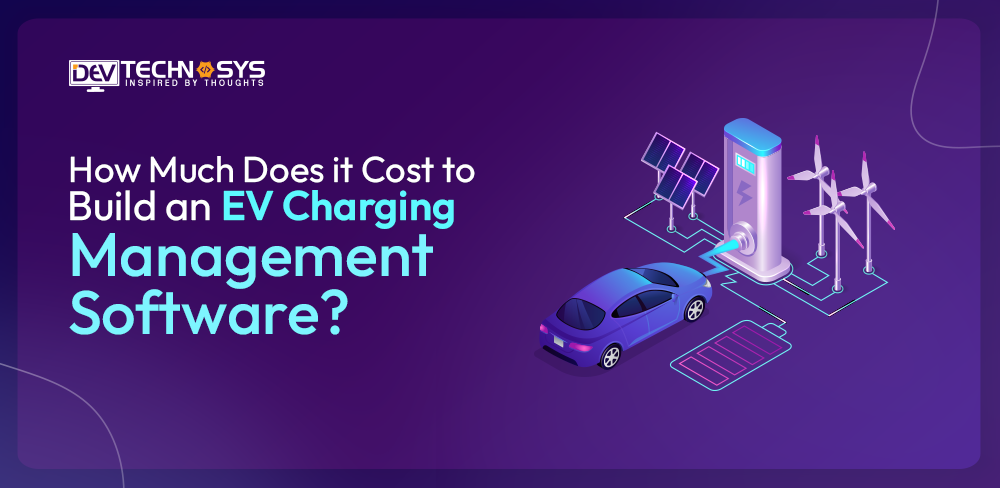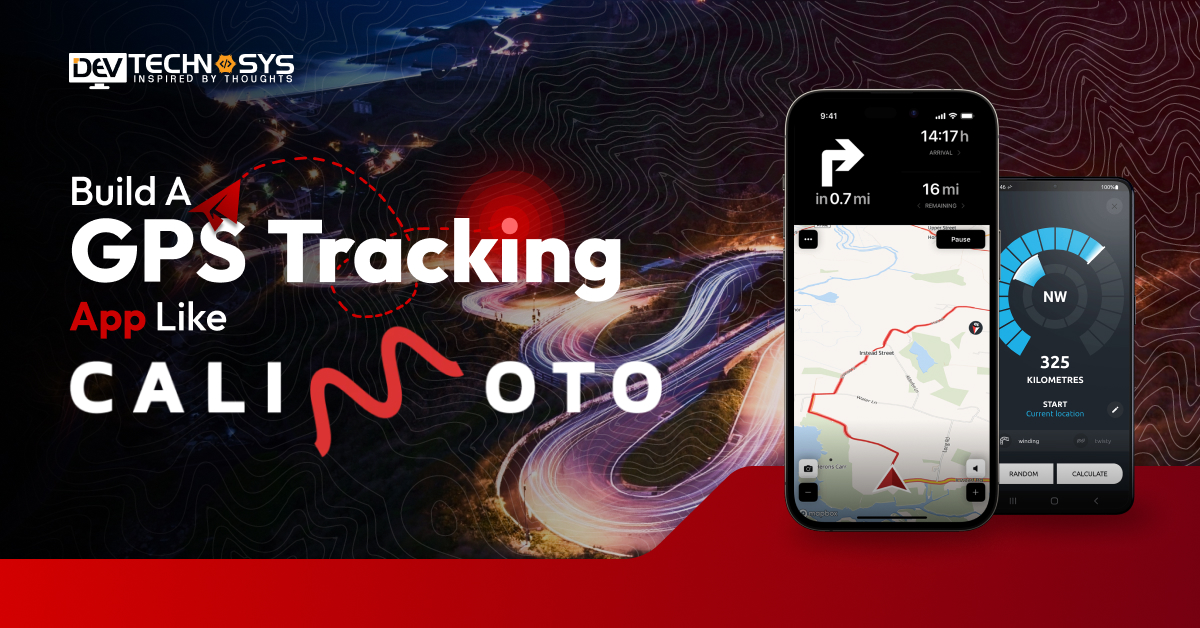“The era of electric vehicles is dawning.” – Elon Musk
Governments all across the world are actively supporting electric vehicles, which is not unexpected. Why not, when EVs are a viable alternative to gasoline-powered vehicles? EVs have shown that there is a silver lining in the face of ever-increasing global warming and pollution.
By 2030, the US is expected to have 48 million electric vehicles, according to Mckinsey & Company. EV charging management software will be more in demand as there are more EVs on the road.
According to the report, 30 million chargers will be needed in the US. Out of these, 1.2 million will be public chargers. The rest will be installed by homeowners. This is why EV charging management can be a winning strategy.
Therefore, if you want to enter the EV industry and create EV software, you are in the right place. Next, you might ask: What is the EV charging management software development cost? Thus, this blog will reveal how much money you need to spend on EV charging solutions.
Let’s get started.
What is EV Charging Management Software?
An EV charging management software is a system that has the ability to manage and regulate the charging procedures for electric vehicles on various vehicle platforms and in various driving modes.

Numerous elements of the EV charging management system allow for the acceleration of EV charging procedures. These include billing management, monitoring charging stations, payment processing and charging station management.
Market Statistics of EV Charging Software
The EV charging software market has been increasing with the advancement of electric vehicles. So, now let’s have a look at the current market stats:
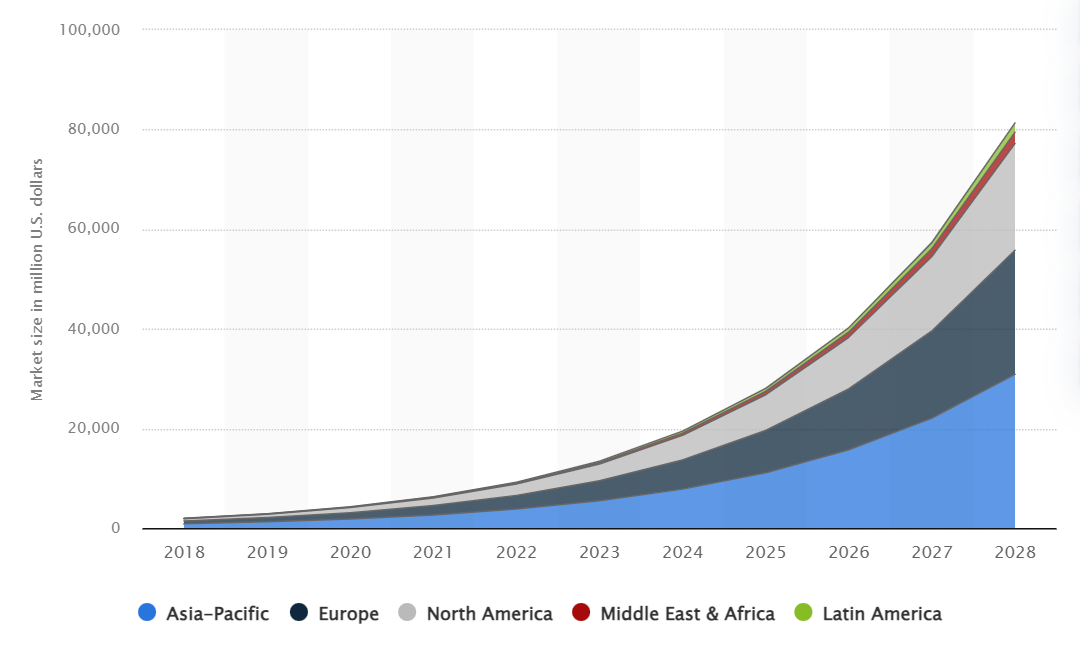
- Asia-Pacific is the world’s largest market for electric vehicle charging systems. The market is expected to reach 30.8 billion U.S. Dollars by 2028. This represents a 42 percent compound annual growth from the 2.6 billion U.S. dollar market of 2021.
- By May 2023, there will be over 138.100 plug-in electric vehicle (EV) charging outlets in the U.S. California has a large number of charging outlets, almost 44,600, both public and private.
- China is one of the largest markets for electric vehicles, which is not unexpected.
- The National Electric Vehicle Infrastructure Program has granted Texas the most money for 2022.
- In January 2019, the patents for electric vehicle charging infrastructure filed around the world most commonly cited wireless or inductive charging. Patents relating to charging inventions accounted for 22 percent of all patents.
By looking at the above stats, you are now clear that the market for EV charging is not going to stop. Now is the appropriate time, you should invest in an EV charging station finder app like PlugShare and take your business to new heights.
Top 5 EV Charging Management Software
Here are the top EV charging software and platforms that you must take into consideration. So let’s have a look:
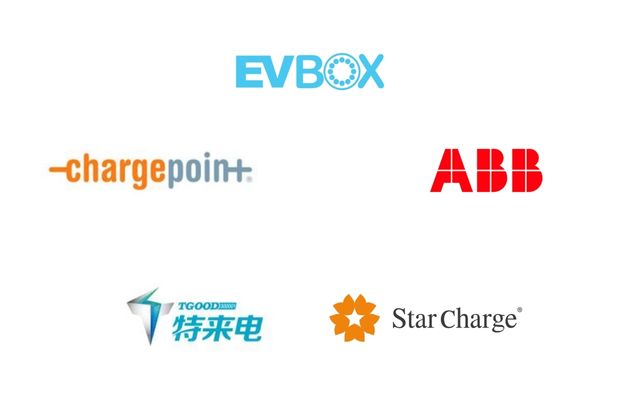
1. ChargeLab
ChargeLab is a hardware-agnostic, white-label electric vehicle charging software that powers (no pun meant) some of North America’s most popular EV chargers. ChargeLab is akin to Android, while Tesla’s software works only with their products.
ChargeLab focuses on interoperability and flexibility. This allows users to fine-tune charging management for their fleet, without sacrificing quality. Its powerful and easy-to-use features make it one of the most popular EV charging programs available.
2. EV Connect
EV Connect, another white-label charging station solution, is available for schools, hospitals and hotels. This electric vehicle charging management system provides white-glove setup and installation, as well as consultation services to make it as simple as possible. EV Connect has received positive reviews from customers on the App Store and Google Play.
3. ChargePoint
ChargePoint offers both software and hardware, making it an excellent choice for companies looking for a comprehensive solution to their electric vehicle charging needs. ChargePoint has the largest network in the US, and even beyond, of EV charging stations, but it does not have as many as Tesla, the company’s nearest competitor.
4. Shell Recharge Solutions
Shell Recharge Solutions is an EV charge management software backed by the biggest name in the energy sector, offering a complete solution for charging EVs. The robust software is suitable for cities, fleets, retailers and more.
5. Driivz
Driivz’s services are centered on optimizing energy consumption and balancing it throughout the day. It helps reduce fees during peak hours by reducing local grid capacity with intelligent charging technology.
This EV charging billing software can also redirect the energy to local storage at times when EV charging management software development costs are lowest. This results in lower operating EV charging station infrastructure costs.
Key Features of EV Charging Management Software
Now that you have the most popular charging station management system, we will now discuss the key features that you must integrate in your software. So let’s check out:
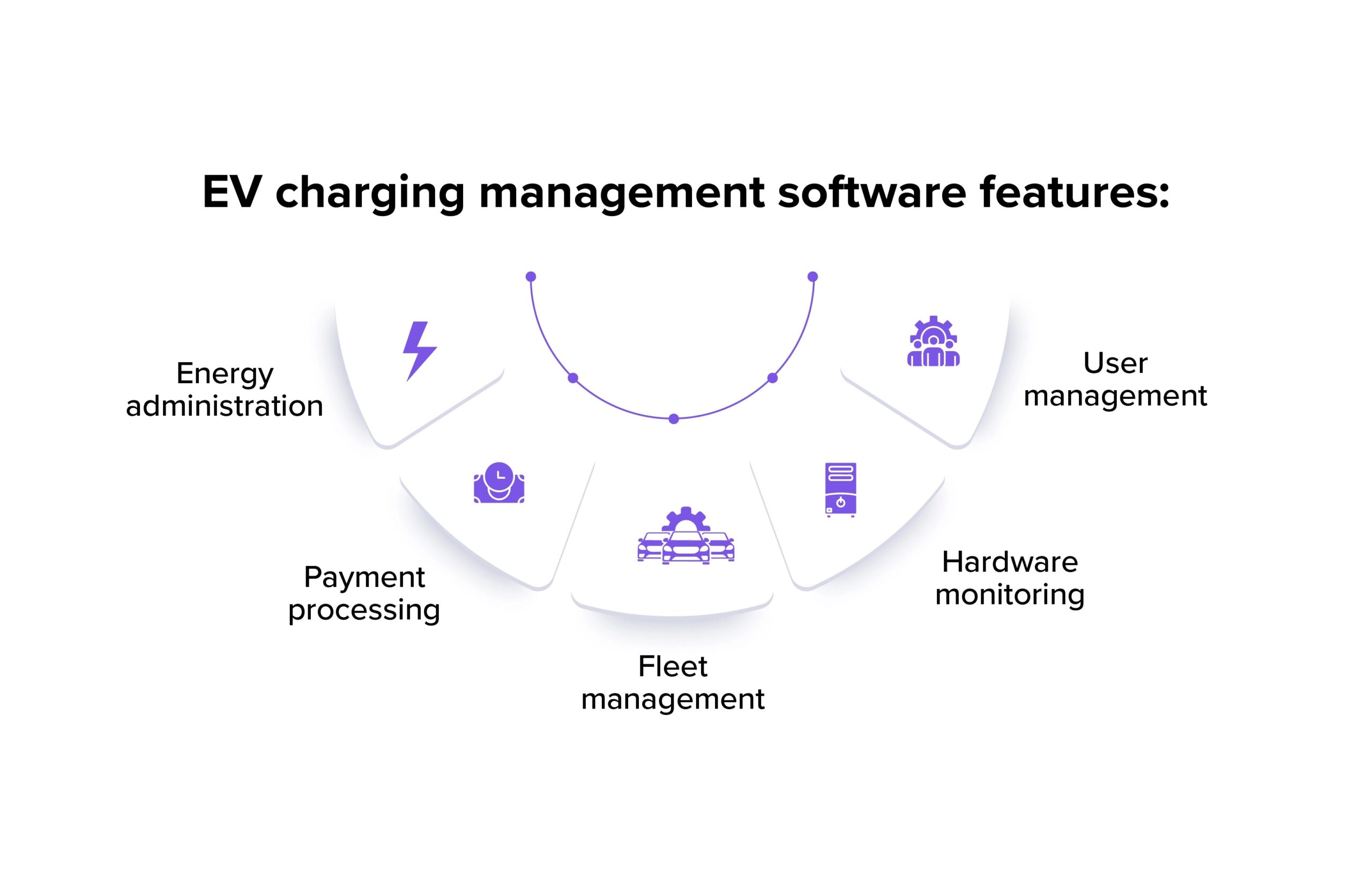
● Payment Processing
To serve a broad range of customers, EV charging stations must accept multiple payment methods. Retail, commercial or multifamily property managers might want to offer discounted pricing to their residents or employees.
They may also wish to give discounts to those who belong to a certain network or reduce prices at off-peak hours. Best-in-class software for EV chargers can accommodate a wide range of payment preferences.
● White-labeling
White-label products allow a company to add their brand to an existing product. The brand appears to be the source of the products and solutions from the perspective of the customer.
White-label charging software for EVs allows retailers, multi-family properties and commercial real-estate companies to gain trust from consumers by using familiar branding. It also boosts the company’s image through its positive association with green energy. Additionally, if you are new to this industry, you must know the EV charging station business cost before you commence it.
● Hardware Management
It is important that network operators and fleet owners address charger and network problems quickly. Software for EV charging must include features such as remote troubleshooting, notifications, and support for better functioning.
● Energy Management
Managing a group of EV chargers can be more fluid than managing gas pumps. You will need to adjust the power distribution between different chargers depending on the available power, how many vehicles are trying to charge and electricity prices. Software that manages energy can optimize the cost to build electric car charging stations and ensure you don’t overload your electrical infrastructure.
A system for EV energy management must also be able to comply with local electrical safety regulations. The best EV charger software lets non-technical people control power distribution, and adhere to local regulations.
● Fleet Operations and User Access
A centralized platform that enables communication with drivers and vehicle tracking is necessary for fleet management. They also need to control access to electric vehicle chargers. New EV charging stations owners must also decide whether they want their chargers to be open to the general public or restricted to their own fleet.
A fleet management software development solution for EV chargers allows users to authenticate and create a permissions system that is specific to their business.
Read More: Build an App Like Plugshare
Factors Influencing The EV Charging Management Software Development Cost
It is essential to know that only an EV app development company with a dedicated focus on EV software can provide you with the best returns for your investment and pave the way for your EV management software to succeed in the competitive ecosystem.
So let’s have a look at the below factors that affect the EV charging management software development cost:
1. Software Complexity
The complexity of software has a major impact on the EV charging management software development cost. Building complex EV software that has a large feature list will cost more than simple software.
It is also important to note that software that has been developed with features that are mapped according to the market needs and audience analysis can offer you maximum traction within this competitive environment.
2. Features List
The list of features is one of the main factors that directly affects the cost to build an EV charging station software. You should be aware that software with a complex feature set will cost more than software with fewer features. Nevertheless, software that addresses the EV charging industry’s pain points with a set of dedicated features will gain traction on the market.
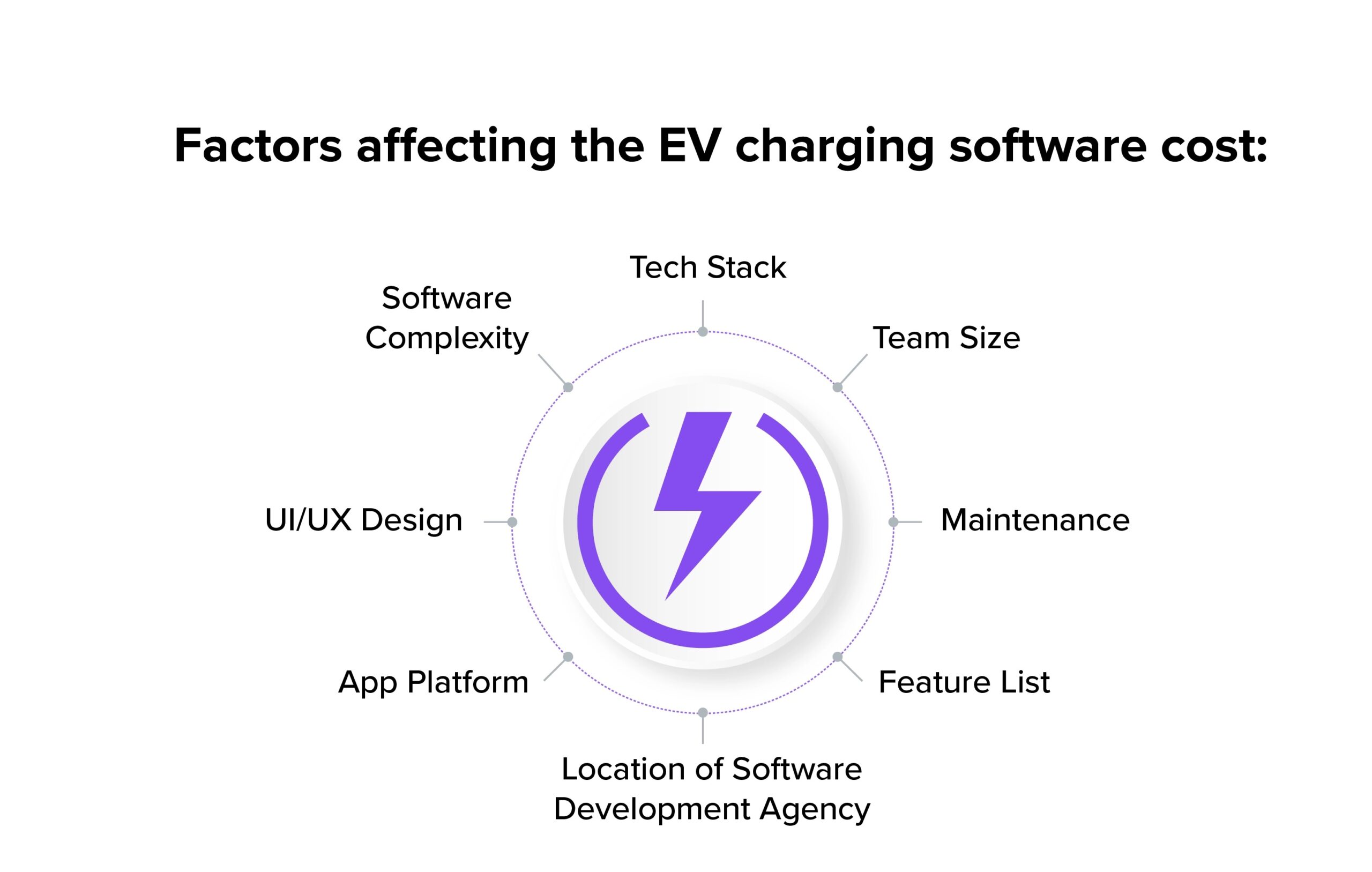
3. UI/UX Design
A well-defined UI/UX is essential for the development of robust EV charger software. A seamless EV charging UI/UX can increase user engagement and retention rates. The EV charging management software development cost can vary because it’s necessary to perform multiple tests to ensure that the design prototype functions seamlessly.
4. Location of the Development Agency
The cost to design EV charging software may vary depending on where the software development company is located. The hourly development rate in Asia, for example, is lower than that in the UK and the US.
5. Maintenance
The cost of developing EV charging station software is affected by the quality and efficiency of software maintenance. To ensure that web or mobile applications run smoothly on all platforms, and offer optimal performance, it is essential to take important actions.
To maintain the lifespan of an element of software and a positive user experience, proper maintenance is crucial. The software maintenance costs include the charges necessary to maintain the software’s bug-free status, as well as the charges needed to implement new technologies or upgrade the software to meet market demands.
6. Tech Stack
For the development of software for EV charging, a strong technology stack is essential. Implementing the right technologies can help you gain immediate traction on the market, and position your business for future success. Additionally, you must know the cost of EV charging station finder app development is dependent on the technologies that are used to implement the features and functionality.
7. Team Size
Another important factor in determining the EV charging management software development cost is the size of the team you hire software developers. You can choose to outsource the project to a dedicated team of software developers.
Although the former may reduce your overall budget for development, their lack of experience and resources will inevitably affect the quality of software. Hiring a dedicated team, on the other hand, can provide you with the industry expertise that is needed at a rate optimized and maximize ROI.
Cost to Build an EV Charging Management Software
For a quick brief, the cost of software development for EV charging is between $10,000 and $25,000. However, the EV charging management software development cost is affected by several factors, including the development rate per hour, the technologies used, the features included in the software, and the size of the team.
| Cost Element | Average Cost |
| Hardware and Installation | $5,000 – $8,000 |
| Power Supply and Grid Upgrades | $8,000 – $12,000 |
| Software development | $15,000 – $25,000 |
Moreover, it is difficult to give an exact cost estimate for the development of EV charging software. However, an organization that has years of experience in developing similar software can provide you with an estimated budget based on the custom requirements of your business.
Conclusion
According to a report by Grand View Research, the market for EV charging solutions might grow from 19.67 billion USD in 2022 to 217.06 billion USD in 2030, at a CAGR of 30.6%. This shows that there are lots of opportunities to get a strong return on investment.
All you need is a seasoned custom software development services provider with a qualified team of professionals capable of providing a comprehensive EV charging software solution and also discuss the EV charging management software development cost before you hire them.
Frequently Asked Questions
1. How to Build an EV Charging Management Software?
To build an EV charger management software, you need to follow the below steps:
- Define requirements and features.
- Design user interface and system architecture.
- Develop backend and frontend components.
- Integrate with charging hardware and payment systems.
- Implement user authentication and data security.
- Test thoroughly for functionality and scalability.
- Deploy and monitor for continuous improvement.
2. How Much Time Does it Take to Build an EV Charging Management Software?
Generally, the time frame for an EV charger management system relies on several factors. For instance, software complexity, UI/UX design, Functionalities etc. On average, it will take 3-5 months for basic software whereas it can go up to 9 months or more if you integrate more functionalities and want robustness in your software.
3. How to Reduce the EV Charging Software Development Cost?
To reduce EV charging management software development cost, prioritize essential features, adopt an agile development approach, utilize open-source technologies, leverage third-party APIs, and minimize complex integrations. Additionally, streamline testing and focus on scalability for efficient resource allocation.
4. What is the Maintenance Cost of EV Charging Software?
The maintenance cost of EV charging software can vary widely depending on factors like system complexity, features, and scale of deployment. It typically includes expenses for updates, bug fixes, server maintenance, and customer support. A rough estimate could range from $5000-$8000 annually.
5. How To Start An E-scooter Rental Business?
To start an e-scooter rental business, follow these steps:
- Market research and business plan.
- Legal and regulatory requirements.
- Procure e-scooters and technology.
- Choose operational areas.
- Develop a user-friendly app.
- Set pricing and payment systems.
- Implement safety measures.
- Launch and promote the service actively.
